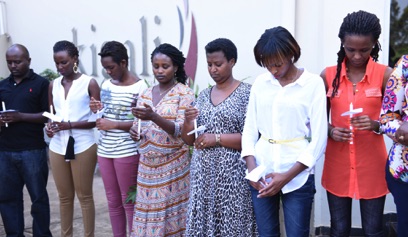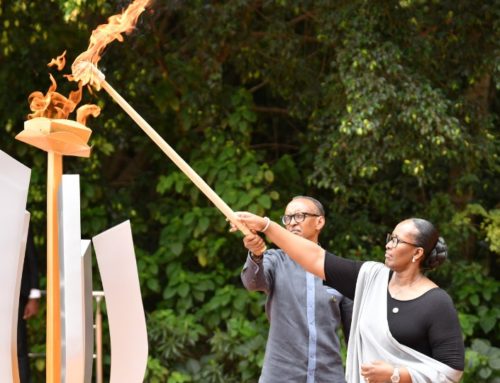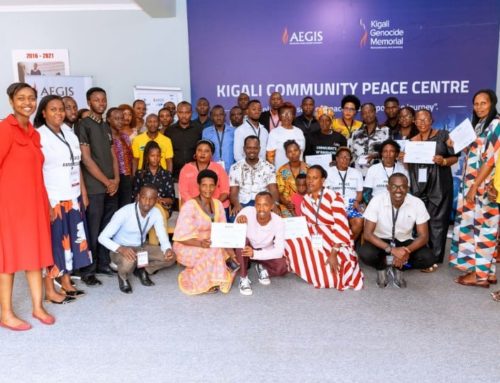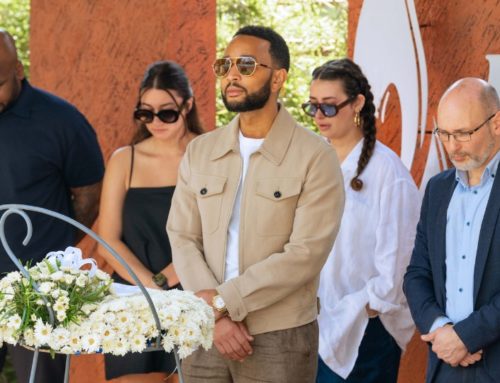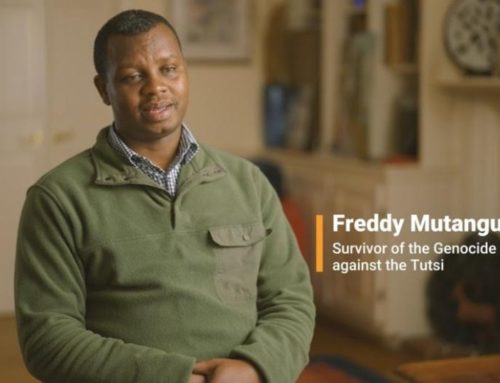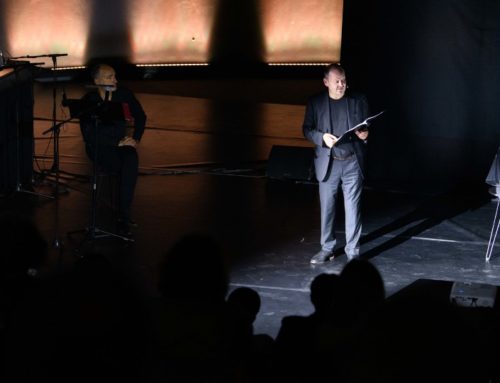Rwandan survivors yesterday gathered at the Kigali Genocide Memorial in the country’s capital, where some 250,000 victims of the 1994 genocide against the Tutsi lie buried, to commemorate a genocide which took place two decades ago on another continent – in Srebrenica, Bosnia, in July 1995.
Coming together on the eve of the official commemoration in Bosnia, Rwandan genocide survivors and staff of the Aegis Trust, which is responsible for the Kigali Genocide Memorial, gathered to watch short video messages from several Srebrenica genocide survivors before lighting candles of remembrance and holding a minute’s silence to honour the lives of the more than 8,000 Bosnian Muslims murdered at Srebrenica – and the hundreds of thousands who were murdered or subjected to ethnic cleansing across Bosnia, especially in places such as Prijedor, Foča and Višegrad, from 1992 to 1995. A short video of this event can be viewed on Youtube (http://youtu.be/1EmqFQBEpRY).
“I have this message for you in Kigali. I’m really so grateful that you remember the 20th anniversary of the Srebrenica genocide; that you will come together, that you will speak about Srebrenica, that you will remember our victims,” commented Hasan Hasanovic, a survivor and curator at the Srebrenica-Potocari Memorial, whose father and twin brother were murdered in 1995. “The 20th anniversary on Saturday is very important, because we want to send a message to the rest of the World that we still have unsolved problems, that we need people to learn about this, we need the World to stop denial of genocide, and we need Serbia to recognise the genocide without any exceptions. We cannot bring the dead back, but we can learn from the lesson of Rwanda and other subsequent genocides, hoping that the World will finally come to its senses and stop future genocides.”
“Today, twenty years after, we remember the Srebrenica anniversary,” said Nedzad Avdic, who survived despite multiple bullet wounds when as a 17-year-old he was gunned down along with other men and boys at one of the massacre sites. “It’s important because we know what was going on there in Srebrenica, we know what happened in Rwanda, and I have a fear that it can happen anywhere.”
Dr Fatima Klempic-Dautbasic had been working in the hospital in Srebrenica before it fell to the Bosnian Serbs on 11 July 1995. Pursued by Serb forces for a week through the forests between Srebrenica and Tuzla, she was among the minority who survived the death march. “I know that you people of Rwanda have very similar experience; that you have lost many members of your family,” Fatima says. “I would like to be with you to tell you how I feel in this moment, and I want to tell you that I understand the pain in your heart. I would like to be with you to light a candle for your families, and for our families too. You have to be strong. As strong as we try to be. And you have to talk to everybody about how genocide will take your cousins, your sons, your fathers. We have to teach young generations to not forget the genocide we survived. God bless you.”
“Genocide happened in Srebrenica while in Rwanda we were still mourning, and once again the World failed to protect,” said Yves Kamuronsi, Country Director for Aegis in Rwanda, himself a survivor of the 1994 Genocide against the Tutsi. “We are gathered here to show solidarity with the survivors at Srebrenica and the people of Bosnia as they remember. We are gathered because the World has to learn from what happened in Srebrenica and in Rwanda. We thank Nedzad, Hasan and Fatima for sharing their experiences with us, and we want you to know that today, our hearts are with you in remembrance.”
“Genocide at Srebrenica was the greatest mass atrocity in Europe since the Holocaust,” says Dr James Smith, CEO of the Aegis Trust and President of the UK’s National Holocaust Centre. “Coming as it did on the heels of genocide in Rwanda, and just months before we opened the Holocaust Centre, it stopped us in our tracks. How could we dignify the memory of past victims if doing too little to protect people at risk in the present and the future? For us, the answer to that question crystallised as the Aegis Trust – an organisation working to prevent genocide, with the voices of survivors at its heart.”
Established by the Aegis Trust in 2004 at the request of the Rwandan Government and Kigali City Council, the Kigali Genocide Memorial includes a segment on genocide in Bosnia in a permanent exhibition titled ‘Wasted Lives’, exploring mass atrocities through the 20th Century. It continues to be run by Aegis today on behalf of CNLG (Rwanda’s National Commission for the Fight against Genocide) as a place both of remembrance and learning for a new generation.
Readers can see a short film of this event on Youtube. Photographs from the event can also be viewed on Flickr.

